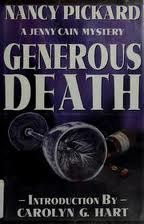Florida woman– yes, there is such a meme– almost set off a bomb in a Tampa WalMart. Of paramount concern, as evidenced by multiple headlines, she hadn’t paid for the goods used to MacGyver the bomb.
Details remain sketchy, but the incident might have come about something like the following…
Bang!
Emma’s day started with an explosion, not the good kind. She stared at her sad Toyota, its left front WalMart-brand tire blown out. Further under the car, a pool of Great Value oil gathered.
She slammed the car door. Signs out front advertised Great Value powdered peanut butter and Moochie the Slacker Sloth, endorsed by author Eve Fisher. Emma grabbed a shopping cart and ignored the WalMart greeter.
She whipped past Quest Diagnostics who’d collected blood and urine samples. Either they or the Great Value early pregnancy test kit were wrong, she wasn’t sure which. Maybe her craving for all things pickle was trying to give her a clue– pickle freeze pops, pickle chapped lip balm, even the pickle yodeler.
Emma stomped past the WalMart pharmacy. They’d refused to honor her medical marijuana card. When she loudly enquired about medical meth, they’d asked her to leave.
She continued, ignoring a woman in pajamas entering the in-store McDonalds. The WalMart eyeglasses shop looked fuzzy through her GV glasses. Money Services had cost her $1452 in a combined Nigerian prince and IRS scam.
Emma stopped at the salon to speak with her sister, Ella.
Ella said, “You need what?”
“Nail clippings, as many as you can get.”
“But… Is this another of your weird inventions?”
“Just do it. Sweep them up, whatever. Nails, real, artificial, I don’t care. Okay?”
Once upon a time, Emma had made the ideal WalMart customer. Where had it all gone wrong?
Chinese products, that’s what. No, even before that, her appearance on Shark Tank. She’d gone on the show to tout her latest invention, the Pooch Pouch, a hoodie sweatshirt with a built-in pocket for her puppy, Little Scabies.
Mr Wonderful himself, Kevin O’Leary, laughed his arse off.
Her ex-boyfriend had tried to warn her. Afterward, he must have heroically bitten his tongue.
Then what happened? The Kittyroo launched, an identical Chinese knockoff sold by WalMart. It wasn’t fair.
WalMart Chinese products drove her nuts. It wasn’t merely the lead paint on the toys, but nothing seemed to work right. Their melamine powdered milk could maybe kill you, but the ineffective garden insecticide couldn’t knock off a fire ant. The powders looked idential. Heck, they even tasted the same. When she added the insecticide to her now ex-boyfriend’s cereal, he merely burped and left for work.
She’d come to hate him. When she bought WalMart’s sexy Halloween mermaid skeleton costume, he stared at her weirdly. He’d had the same look when she’d given him a pink octopus mug.
Emma had tried to make her house a home. WalMart provided her biker gnomes and gangsta gnomes. She ordered the WalMart Golden Girls Chia Pets.
For the kitchen, she’d bought the Poop Emoji cake pan, bacon bowls for taco salads, and cock-flavored ramen noodles.
For her bathroom, she’d picked out Pain in the Butt Diaper Rash Cream, WalMart Christmas-themed toilet paper, and Aztec Secret Indian Healing Clay. Plus the ultimate bathroom book How to Poo on a Date.
Little Scabies fled when she presented her puppy with doggy nail polish and a Dinosaur Pet Costume. Her ex and even her sister Ella gazed at her strangely.
Well, she had a solution for him. She phoned and ask him to meet her in WalMart. He groaned but agreed to come.
She wheeled her cart with the wriggling wheel to Housewares. She selected the largest Mason jar she could find. In Home Improvement, she snapped up denatured alcohol and Chinese-manufactured paint thinner. She dumped the contents into the jar.
In Girls Fashion, she picked out pink shoestrings. From Outdoors Goods, she bought a giant box of matches. She returned to the WalMart Salon.
Her sister cautiously handed her a baggie of nails and clippings. Ella said, “I added clippings from pedicures. Is that okay?”
“Sure, peachy, wonderful,” Emma said.
Her phone beeped. Text message. From ex-boyfriend. “Parking now. Meet you Sporting Goods.”
Emma dashed to the back of the store. Under a suspended canoe, she knelt and added the nails to the solution. She draped a shoelace into the jar. After a moment, she felt it. The shoestring wasn’t soaking up the liquid. What the flip? Was it some kind of weird non-absorbent Chinese polyester?
Quickly, she undid one of her own laces. Yes! In moments, it was thoroughly doused. It would make the perfect wick.
In the distance, she saw her boyfriend arriving. She’d already selected a WalMart crematory jar, much cheaper than the sports fan coffin.
Calmly, Emma opened the WalMart-brand matches. She struck one.
Nothing.
She struck again. Nil.
And again. Nope.
She tried another match. Nada.
And another. Zilch.
She grasped a half dozen and stuck the strip.
One gave a little pizzle and snuffed out.
Weeping, she seized a handful and tried fruitlessly to ignite them.
Nothing, not even a poof.
Emma burst into tears as a security guard closed in.
“Ma’am? Did you pay for those goods?”
And that might be how a Florida woman almost set off a nail bomb in a Tampa store. Perhaps. Note that all of the above are genuine WalMart products.



















































